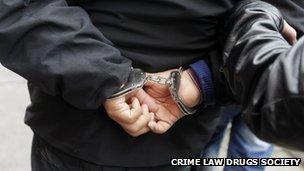Crime falls 7% to record low in England and Wales
- Published

Overall crime figures have fallen to half the peak level recorded in 1995
Crime has fallen 7% to a record low in the last year, the Crime Survey for England and Wales has shown.
The drop comes despite a 9% rise in sexual offences, which was partly driven by the Jimmy Savile revelations of abuse.
Crime prevention minister Norman Baker said England and Wales are safer than they have been "for decades".
The headline crime figure is the lowest since the survey began in 1981, and has now fallen to half its peak level, recorded in 1995.
Savile effect
However, the Office for National Statistics, which collates the survey, said the number of historical sexual offences - those which took place more than 20 years ago - recorded by the police has doubled.
The Savile inquiry has encouraged greater numbers of people to report historical sexual offence to the police.
The ONS said that in the last five years there has been a 35% rise in the number of rape offences recorded by the police - partly due to new guidance on the way in which such crimes are recorded.
An increase in theft was also recorded by the Crime Survey, with offences up by 8% in the last year.
Evidence suggests the rise was driven by the theft of smart phones, and involve pick-pocketing rather than violence or threats.
The majority are counted as stealth thefts - where the victim is unaware items are being stolen.
Meanwhile, though credit card fraud levels remained flat, overall fraud offences have jumped by 21% in the last year.
The ONS said the cause of this rise would become clearer in the next one or two years, but it could be down to a new centralised method of recording fraud.
'Still too high'
Max Chambers, head of crime and justice at the think-tank Policy Exchange, said: "Whether you believe it's as the result of an ageing population, better policing and prevention, or the impact of the internet, there is little doubt that Britain is becoming a safer place to live, do business and raise a family.
"But crime is still too high and there are pockets of the country which remain blighted by anti-social behaviour and gang activity.
"While the latest figures show that the police have been able to cut crime substantially even with fewer resources, they must now redouble their efforts to tackle the hardcore of prolific offenders who commit offences that can often disproportionately hit the poor and the vulnerable."
While welcoming falling crime rates, Jon Collins, deputy director of the Police Foundation - an independent policing think-tank - said it was important not to be "blind to new and emerging challenges".
He said: "The police and the government should be wary of resting on their laurels.
"While crimes such as burglary and car crime are clearly not the problem that they once were, it's possible that the official crime figures are just not picking up the extent to which new opportunities for crimes like fraud and counterfeiting have emerged, particularly online."
Crime prevention minister Norman Baker said: "Police reform is working and crime is falling.
"This is really positive news. Forces are rising to the challenge of making savings whilst cutting crime and delivering a better service to the public.
"England and Wales are safer than they have been for decades but we will continue to deliver measures which keep pace with the changing nature of crime and improve our ability to combat emerging issues."
The Crime Survey for England and Wales asks people aged 16 and over living in households in England and Wales about their experiences of crime in the last 12 months. These experiences are used to estimate levels of crime in England and Wales.
- Published17 October 2013
- Published31 August 2013